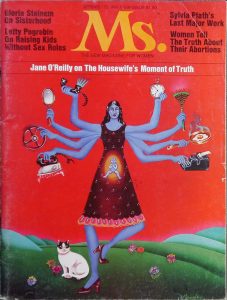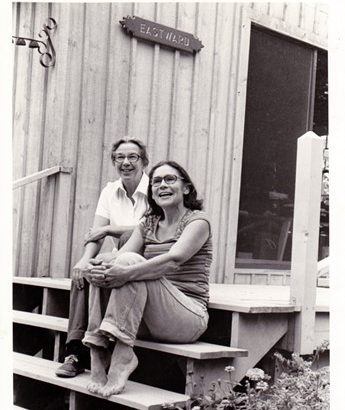By Alex Gerrish
Casey Miller and Kate Swift were both outspoken advocates for eradicating gender bias in the English language. Over their 30-year working relationship in East Haddam, they published countless articles and two books—Words and Women and The Handbook of Nonsexist Writing—that explored nonsexist language and promoted more equal opportunities for women.
Before Connecticut
Casey Miller was born on February 26, 1919, in Toledo, Ohio, and earned a degree in philosophy from Smith College. She went on to serve as a lieutenant in the US Navy during World War II, working in Washington, D.C. to break Japanese codes. In 1967, she moved to East Haddam to work as a freelance editor and writer.
Kate Swift was born on December 9, 1923, in Yonkers, New York. She graduated from the University of North Carolina at Chapel Hill in 1944 with a degree in journalism. Swift served two years in the US Army and worked as an information and education specialist until being honorably discharged with the rank of sergeant. Both Miller and Swift held numerous jobs and lived in varying places before crossing paths in Connecticut and forming their partnership.
The Beginning of a Journey
Miller and Swift’s working relationship began in 1970 when they were editors of a sex education handbook for high schoolers. Despite an audience of all high schoolers, the author wrote the handbook from a male point of view and only used male pronouns—he, him, his, etc.—alienating female readers. This realization alarmed both Miller and Swift and they soon began finding other examples of sexism in popular texts. From then on, both women devoted their careers to raising awareness about sexist language.
While editing the handbook, Miller and Swift had no intentions of writing a separate book of their own. Per the advice of their publisher, however, they mentioned a book project in their author biography. As the handbook gained popularity, readers began asking about the book project to which they alluded. This interest encouraged Miller and Swift to publish Words and Women in 1976.
Rewriting the Norm

Cover of the preview issue of Ms. magazine that included Miller and Swift’s article, Spring 1972 – Wikimedia Commons
Miller and Swift’s research had a significant impact on linguistics and the power of language. In particular, Words and Women outlined how popular media assumed most “genderless” characters to be male. Miller and Swift wrote, “The linguistic presumption of maleness is reinforced by the large number of male characters, whether they are human beings or humanized animals, in children’s school books, storybooks, television programs, and comic strips…In short, the male is the norm, and the assumption that all creatures are male unless they are known to be female is a natural one for children to make.”
Their assertions proved controversial. For example, many people believed that words such as “firemen” included everyone, despite the male oriented suffix. A large part of Miller and Swift’s mission, however, was not just to outline the problem, but to convince others to help fight against the stereotype.
The authors argued that gender bias is revealed in the way writers and others use language. Using the changing demographics of teachers as an example, they wrote, “Until a few years ago most publications, writers, and speakers on the subject of primary and secondary education used ‘she’ in referring to teachers. As the proportion of men in the profession increased, so did their annoyance with the generic use of feminine-gender pronouns.” If men did not want to be grouped with female-oriented language, why should women be okay with being grouped with male-oriented language? After Miller and Swift’s first book, readers became increasingly open to communicating in a more inclusive, less male-oriented way. As a result, Miller and Swift published their second book, The Handbook of Nonsexist Writing, in 1980.
Along with their books, Miller and Swift continued to promote inclusion through speeches and articles in prominent publications such as Ms. magazine. The literary world further celebrated Miller and Swift by inviting them to speak at the Conference on Language and Style and many others. In addition, the authors championed social causes such as marriage equality, abortion rights, and more.
Miller and Swift worked closely together as business partners and dear friends for the remainder of their lives. Their work not only opened doors for women but also began conversations on the power and adaptability of language that continue to this day.
Alex Gerrish is the Programs Manager at the Noah Webster House and holds a B.A. in American Studies from Western New England University. He would like to extend a special thanks to the East Haddam Historical Society and the Swift/Gravino family for their assistance with the research for this article.









